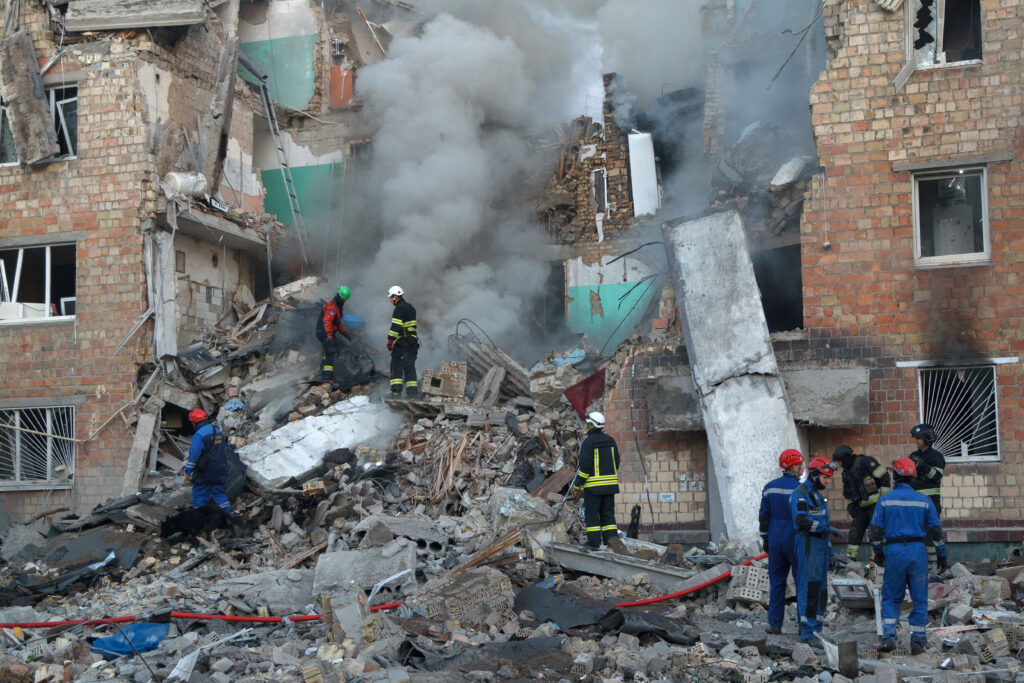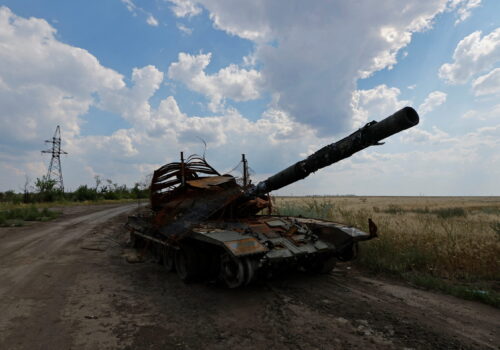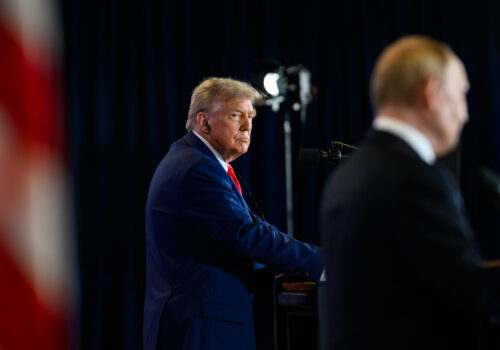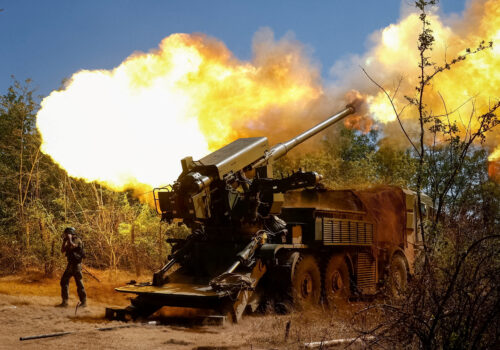The beauty and peace on display in Kyiv at any given moment is an illusion that can be crushed at night with an apartment building crumbling on top of you.
That’s how the city’s mayor, Vitalii Klitschko, put it to us during our recent visit to the Ukrainian capital. His warning was prescient. Just last week, Russia unleashed its second-biggest aerial attack against Kyiv since the start of the full-scale invasion, killing at least twenty five people and injuring sixty-three. More than six hundred drones and ballistic missiles damaged buildings and residences throughout the city. One apartment building in the southeastern part of the city was directly hit and completely destroyed.
A few days before Russia’s August 28 attack, the Atlantic Council’s Eurasia Center took a group of congressional fellows to Ukraine for the second time since Russia’s full-scale invasion. Our group, which included fourteen Senate and House staff members from both parties, spent several days in Kyiv and Warsaw. We rode the train overnight from Poland to Kyiv and spent two full days meeting with Ukrainian officials, opposition figures, civil society organizations, military personnel, and journalists to discuss the state of the war and ongoing diplomatic efforts to achieve a just and durable peace.
Our trip took place against the backdrop of some of the most high-stakes diplomacy since the beginning of Russia’s invasion. Two weeks earlier, US President Donald Trump and Russian President Vladmir Putin had met in Alaska to discuss the war. This was followed three days later by seven European leaders accompanying Ukrainian President Volodymyr Zelenskyy to the White House for more meetings. But while there has been a flurry of efforts far from Ukraine to get Putin to negotiate in earnest and stop Russian attacks, the reality in Kyiv remains unchanged—ordinary life continues under the constant shadow of bombardment.
Russia’s continued attacks on Kyiv are a reminder that Ukraine needs a cease-fire before it can truly negotiate an end to the war. As one official in Kyiv said, “it is hard to do diplomacy when you’re under constant attack.”
Louder than words
Putin may claim that he is ready for peace in his conversations with Trump, but Russia’s actions speak otherwise. Trump has repeatedly threatened severe consequences for Putin if the violence continued, yet Putin has avoided further pressure or even strong condemnation from Washington as the Ukrainian death toll has climbed.
Within the group’s first hour in Kyiv, we witnessed a large funeral procession for a fallen Ukrainian soldier going through St. Michael’s Square and down the streets of Kyiv’s city center. The somber notes of a Ukrainian mourning song were broken only by the sounds of car doors opening as traffic stopped and civilians stepped out of their vehicles to kneel and pay tribute. We encountered several other funeral processions throughout our time in Kyiv, including two nearly back-to-back during a visit to the makeshift war memorial at the Maidan.
Such events reflected the realities of wartime Kyiv as much as the acts of resilience we witnessed there. At a hospital, we spoke with several soldiers who were learning to use prosthetics and heal the physical and psychological trauma caused by their time fighting Russian aggression on the front. One soldier expressed that he wanted to learn to walk well enough again so that he could rejoin his unit on the front. These encounters underscored Ukrainians’ determination to defend their homeland and their clarity about Putin’s goal and what it means for their future: Russia’s war is far from over, and Ukrainians’ best defense is a strong fighting force.
The strongest security guarantee
The consensus among the officials we spoke with was that Kyiv sees no change in Putin’s overall aims in Ukraine. The Russian president, they believe, is merely using negotiations with Trump as a stalling tactic to avoid harsher sanctions.
Ukrainians are under no illusion that any promises from Putin to end his bloodshed would be enough to protect them. History has taught them that much. While Ukraine continues its efforts on the battlefield, its main diplomatic focus is centered on getting clarity and commitments for future security guarantees.
Ukraine’s security must rest on both its own strength and the support of its allies. In Kyiv, it is widely believed that the strongest security guarantee is a capable Ukrainian army, one able to deter Russia for decades to come. Other nonnegotiables include the unconditional return of abducted Ukrainian children, the assurance that Ukraine’s path toward European Union (EU) and NATO membership will not be constrained by Russia, and the refusal to recognize any occupied territory as Russian.
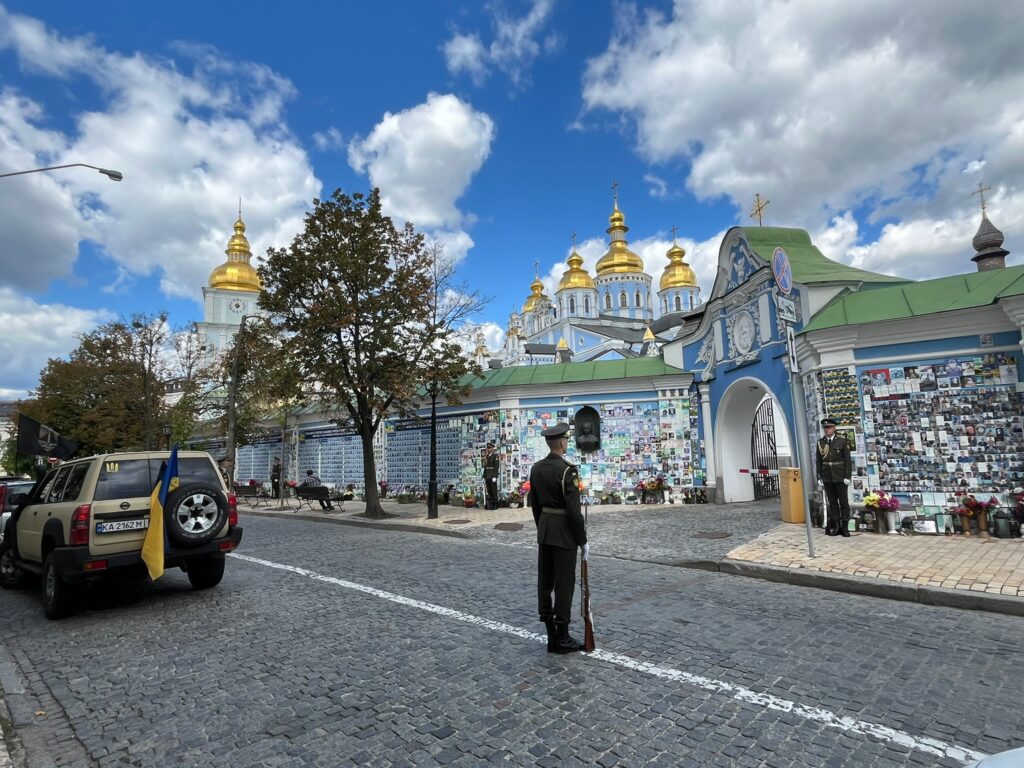
How Warsaw sees the war
We arrived in Warsaw just three weeks after Poland’s new president, Karol Nawrocki, took office. How this transition will shape Poland’s role in discussions around the war in Ukraine remains uncertain. Tensions are evident between the new conservative Polish president and Poland’s pro-EU prime minister, Donald Tusk. Reflecting these internal divisions, Poland was notably absent from the recent delegation of European leaders who joined Zelenskyy in Washington. Nevertheless, Nawrocki is meeting Trump in Washington today for his first foreign trip as president. The meeting is sure to include a focus on Ukraine and Poland’s views on Russia.
Poland has been a major supporter of Ukraine, but throughout the presidential election cycle, frustrations around the influx of Ukrainian refugees in the country flared. Reflecting these rising tensions, on August 26, Nawrocki vetoed a bill on aid to Ukrainian refugees.
Polish-Ukrainian relations may be strained right now over the domestic shift in Poland, but the Polish officials and policy analysts we spoke with made it clear that Poland still stands with Ukraine in its fight against Russian aggression. While there is tension over Ukrainian refugees in Poland, the Polish political establishment is united in its understanding that Russia is an existential threat not just to Ukraine but to Poland as well.
Polish officials involved in defense and foreign policy emphasized to us that Poland would be involved in any security guarantees for Ukraine, seeing them as necessary to prevent Russia from repeating or expanding its aggression. But how exactly Poland will contribute remains to be seen.
We left this trip with heavy clarity. We saw clearly that Ukraine’s fight is about survival and freedom. Poland’s fight is about security for the region, including NATO. And Russia’s aggression has not changed. Therefore, the priority must remain getting a cease-fire in place and European and US leaders agreeing on serious security guarantees, which should ultimately be legally binding so that Ukraine can achieve a lasting peace and turn its focus toward a secure future.
Shelby Magid is the deputy director of the Atlantic Council’s Eurasia Center.
Mercedes Sapuppo is a fellow with the Eurasia Center at the Atlantic Council.
Further reading
Tue, Sep 2, 2025
Putin’s failed summer offensive shatters the myth of inevitable Russian victory
UkraineAlert By Peter Dickinson
The failure of Putin’s summer offensive should help to debunk the persistent myth of inevitable Russian victory and persuade Western leaders to increase their support for the Ukrainian war effort, writes Peter Dickinson.
Tue, Sep 2, 2025
It’s time for Trump to put maximum pressure on Putin
Inflection Points By Frederick Kempe
The US president can have no further doubt about who he’s dealing with in the Russian president. There’s also little doubt about what is needed to end the war on terms that secure peace and preserve Ukrainian freedom.
Fri, Aug 29, 2025
Twenty questions (and expert answers) about the negotiations to end Russia’s war in Ukraine
New Atlanticist By
August saw a flurry of diplomatic activity to end Russia's full-scale invasion of Ukraine. As September nears, Atlantic Council experts share their insights on what to expect next.
Image: Rescuers conduct a search and rescue mission at a five-storey residential building in the Darnytskyi district, part of which is destroyed by an overnight Russian missile and drone strike, in Kyiv, Ukraine, on August 28, 2025. (Photo by Kirill Chubotin/Ukrinform/NurPhoto) REUTERS
